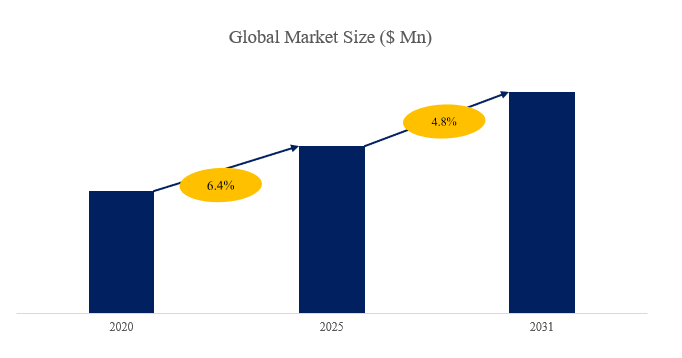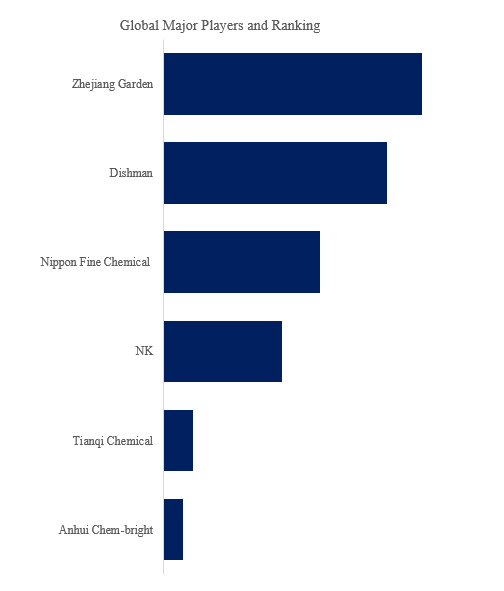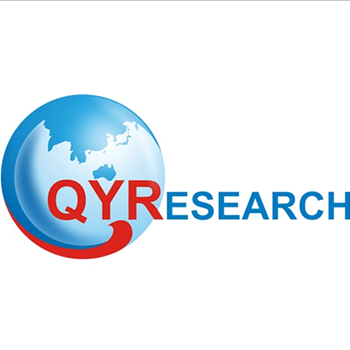Right Now
Cholesterol Industry Analysis: the global Cholesterol market size is projected to reach USD 0.1 billion by 2031,
Cholesterol is a kind of sterol or steroid, of which the chemical formula is C27H46O. Cholesterol is a kind of flaky crystal under solid state, white and odorless. At present, cholesterol is mainly produced with lanolin and is industrially applied as raw materials of Vitamin D3, additive to prawn feed, medicine, as well cosmetics emulsifier and etc. Cholesterol is used in pharmaceutical, cosmetic and crustacean feed applications.
According to the new market research report “Cholesterol - Global Market Share and Ranking, Overall Sales and Demand Forecast 2025-2031”, published by QYResearch, the global Cholesterol market size is projected to reach USD 0.1 billion by 2031, at a CAGR of 4.8% during the forecast period.
Figure00001. Global Cholesterol Market Size (US$ Million), 2020-2031

Source: QYResearch, "Cholesterol - Global Market Share and Ranking, Overall Sales and Demand Forecast 2025-2031”
Figure00002. Global Cholesterol Top 6 Players Ranking and Market Share (Ranking is based on the revenue of 2024, continually updated)

Source: QYResearch, "Cholesterol - Global Market Share and Ranking, Overall Sales and Demand Forecast 2025-2031”
According to QYResearch Top Players Research Center, the global key manufacturers of Cholesterol include Zhejiang Garden, Dishman, Nippon Fine Chemical , NK, Tianqi Chemical, etc. In 2024, the global top four players had a share approximately 86.0% in terms of revenue.
In terms of product type, currently NF Grade is the largest segment, hold a share of 71.3%.
In terms of product application, currently Pharmaceuticals is the largest segment, hold a share of 62.1%.
Market Drivers:
D1: The cholesterol market is influenced by stringent regulatory standards governing its use in pharmaceuticals, animal feeds, and cosmetics. Compliance with safety and efficacy guidelines is essential for manufacturers to ensure product quality and consumer trust. Regulatory bodies impose rigorous standards to safeguard public health, which can pose challenges but also drive innovation and quality improvements in the industry.
D2: The trend toward personalized nutrition and skincare solutions is creating new opportunities for cholesterol applications. Consumers are increasingly seeking products tailored to their specific health and beauty needs. Incorporating cholesterol into customized formulations allows for targeted benefits, such as improved skin hydration or enhanced nutrient absorption, meeting the demand for individualized products.
D3: Emerging economies, particularly in the Asia-Pacific region, are witnessing significant growth in demand for cholesterol. Rapid urbanization, increasing disposable incomes, and a growing middle class are driving the consumption of pharmaceuticals, cosmetics, and high-quality animal products. The expanding healthcare and personal care sectors in countries like China and India present lucrative opportunities for market players.
Restraint:
C1: High risks involved in the cholesterol market is its traditional reliance on animal-derived sources, such as lanolin from sheep’s wool or animal tissues. For consumers adhering to vegetarian, vegan, Halal, or Kosher dietary practices, such sources are problematic. This ethical and religious limitation restricts the consumer base and forces manufacturers to seek plant-based or synthetic alternatives, which are often more costly or less accessible.
C2: Despite cholesterol’s vital biological role and its usefulness in pharmaceuticals, cosmetics, and feeds, the word “cholesterol” often carries a negative connotation among consumers. Many people associate it solely with cardiovascular risk, which can hamper market adoption—particularly in cosmetics or wellness supplements. Educating consumers on the benefits of cholesterol in external or formulated use is still a work in progress and poses a communication barrier for brands.
C3: Cholesterol production is sensitive to raw material supply chains, especially when animal-derived. Disease outbreaks in livestock (such as avian influenza or swine fever) can disrupt supply, increase costs, or raise concerns over bio-contamination. These disruptions impact pricing, availability, and continuity of production, particularly in feed and pharmaceutical sectors where consistency is critical.
Trend:
In the pharmaceutical industry, cholesterol plays a pivotal role in the formulation of lipid-based drug delivery systems. Its ability to stabilize liposomes and improve the bioavailability of active pharmaceutical ingredients makes it indispensable in the development of various medications. The increasing prevalence of chronic diseases, such as cardiovascular disorders and diabetes, has led to a surge in demand for cholesterol-based pharmaceuticals. Additionally, innovations in biotechnology are expanding the use of cholesterol in advanced therapeutic products, further propelling market growth.
Cholesterol is extensively used in animal nutrition, particularly in poultry, swine, ruminants, and aquaculture. In poultry, it is essential for growth, reproduction, and overall health, making it a vital component of feed formulations. The swine industry also relies on cholesterol to enhance metabolic processes and improve feed efficiency. In ruminants, cholesterol supports digestive health and productivity, while in aquaculture, it is crucial for the development of fish and other aquatic species. The rising demand for high-quality animal products and the emphasis on animal welfare are driving the adoption of cholesterol in animal feeds.
In the cosmetics industry, cholesterol is valued for its skin-conditioning and moisturizing properties. It is widely incorporated into skincare products such as moisturizers, anti-aging creams, and lotions to improve skin barrier function and retain moisture. In haircare, cholesterol is used in shampoos, conditioners, and masks to repair damaged hair and enhance texture. The growing consumer preference for natural and biologically compatible ingredients has further fueled the demand for cholesterol-based cosmetics.
The growing consumer preference for natural, eco-friendly, and sustainable products has led to increased demand for plant-derived cholesterol. This vegan alternative aligns with the trend toward cruelty-free and environmentally sustainable ingredients in personal care and pharmaceutical products. The versatility and beneficial properties of plant-derived cholesterol, such as its role as an emollient and barrier repair agent, make it highly valuable in various applications.
About The Authors
Yin Hang
Lead Author
Email: yinhang@qyresearch.com
Tel: +86-15321687458
About QYResearch
QYResearch founded in California, USA in 2007.It is a leading global market research and consulting company. With over 17 years’ experience and professional research team in various cities over the world QY Research focuses on management consulting, database and seminar services, IPO consulting, industry chain research and customized research to help our clients in providing non-linear revenue model and make them successful. We are globally recognized for our expansive portfolio of services, good corporate citizenship, and our strong commitment to sustainability. Up to now, we have cooperated with more than 60,000 clients across five continents. Let’s work closely with you and build a bold and better future.
QYResearch is a world-renowned large-scale consulting company. The industry covers various high-tech industry chain market segments, spanning the semiconductor industry chain (semiconductor equipment and parts, semiconductor materials, ICs, Foundry, packaging and testing, discrete devices, sensors, optoelectronic devices), photovoltaic industry chain (equipment, cells, modules, auxiliary material brackets, inverters, power station terminals), new energy automobile industry chain (batteries and materials, auto parts, batteries, motors, electronic control, automotive semiconductors, etc.), communication industry chain (communication system equipment, terminal equipment, electronic components, RF front-end, optical modules, 4G/5G/6G, broadband, IoT, digital economy, AI), advanced materials industry Chain (metal materials, polymer materials, ceramic materials, nano materials, etc.), machinery manufacturing industry chain (CNC machine tools, construction machinery, electrical machinery, 3C automation, industrial robots, lasers, industrial control, drones), food, beverages and pharmaceuticals, medical equipment, agriculture, etc.
Contact Us:
If you have any queries regarding this report or if you would like further information, please contact us:
QY Research Inc.
Add: 17890 Castleton Street Suite 369 City of Industry CA 91748 United States
E-mail: global@qyresearch.com
Tel: 001-626-842-1666(US) 0086-133 1872 9947(CN)
More Posts


















Report This Post
Please complete the following requested information to flag this post and report abuse, or offensive content. Your report will be reviewed within 24 hours. We will take appropriate action as described in Findit terms of use.


